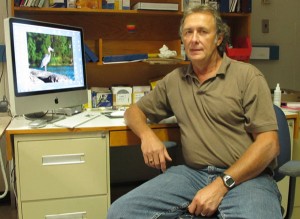Loyalist staff remembers Steve Jobs

Gord Horne, IT-tech instructor at Loyalist College, was one of many Apple Inc. enthusiasts upset by the news of company co-founder and CEO Steve Jobs' passing. "He was Apple. He was the guy," Horne said in an interview. Jobs died Oct. 5 after a long bout with pancreatic cancer. Photo by Renee Rodgers.
By Renée Rodgers
Gord Horne was watching the evening news when a special announcement interrupted the broadcast – Steve Jobs, CEO and co-founder of Apple Inc., had died.
Horne, a technologist at Loyalist College with expertise in Macintosh computers, was upset by the news, as were many others around the world.
“I heard this morning there was half-a-million tweets right after (he died), sort of expressing condolences to Apple for the loss of their leader,” he said.
Jobs died in California Oct. 5. The cause of death has not yet been officially confirmed, but he had been fighting a well-publicized battle against pancreatic cancer since 2004.
Like Horne, Bill White, a photojournalism professor at the college, also appreciates Jobs’ contributions to technology. The department, which once relied on darkrooms to develop photos, is now equipped with Macintosh computers. Rather than working with clothespins and liquid photo developer, students learn Mac-based photo software skills.
White acknowledged Apple products aren’t just used for educational purposes. Part of Jobs’ vision was to incorporate the use of Apple products into everyday life.
“Everything gadget-wise, he’s changed,” said White. “And he’s made toys for adults fun.”
And Jobs’ company has created toys and gadgets galore.
The Macintosh, launched in 1984, was the first in a series of personal computers designed by Apple. Fourteen years later, in 1998, Apple introduced the sleekly designed all-in-one iMac that has since popped up in schools, offices, and homes everywhere. In 2001, Apple released the iPod media player. Later, the first iPhone was unveiled by Jobs in 2007.
Jobs stepped down from his position as CEO of the company in August but remained at the Apple as chairman of the company’s board.
Tim Cook, the man formerly in charge of worldwide sales and operations at Apple, has replaced Jobs as CEO of the company, following Jobs’ recommendation. White, however, wonders if an “innovator” like Jobs can be replaced.
“Like a lot of good business people, I think he (Jobs) had the final say in things,” he said. “Not to say the company is going to fall apart now, but it will be interesting to see what happens.”
Kevin Sansom, a TV and new media professor at Loyalist, is well versed in Macintosh computers. He said it would be hard to get him to switch from his Mac to a PC.
“Their (Macintosh’s) capabilities as far as – not to get too technical – but their central processing unit, their graphics processing has always been leading edge,” he said. “Beyond – I hate to say it – Microsoft.”
Sansom said it would be hard to find someone whose life has not been affected by Jobs’ inventions.
“Even Bill Gates has released a press statement about how he respected Steve Jobs,” Sansom said.
Horne, who remembers when the school received its first Macintosh Plus in 1990, would agree. He is a Mac man to the core.
“There’s not even a comparison (between Macintosh and PC),” he said. “It’s like oranges and apples.”
 Print This Post
Print This Post






